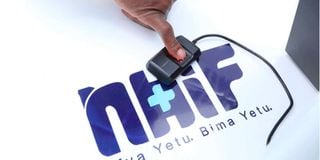NHIF should do more to curb fraudulent acts

An NHIF member undergoes biometric registration at the Wamagana Education hall in Nyeri County on June 2, 2021.
What you need to know:
- The National Hospital Insurance Fund (NHIF) has contributed immensely to provision of healthcare among Kenyans.
- For a paltry Sh500 monthly contribution, the majority poor who are subscribers can offset huge medical bills.
A recent revelation by the National Hospital Insurance Fund (NHIF) of its Sh10 billion annual loss to fraudulent deals was not surprising. The information comes at a time when the health insurer is angling for more funds from employers and the public.
Instructively, the solution to financial deficits in most organisations may not only lie in soliciting for more funds; prudent management of the available finances can go a long way in plugging shortfalls.
Admittedly, NHIF has contributed immensely to provision of healthcare among Kenyans. For a paltry Sh500 monthly contribution, the majority poor who are subscribers can offset huge medical bills — something that was a pipe dream before. Come to think of it; anybody involved in pilferage of such a fund is worse than a murderer, hence, any effort to curb that must be lauded.
Whereas biometric identification of beneficiaries will minimise instances of impersonation, NHIF need do more. A bona fide beneficiary can be identified alright but allow an unauthorised person to access services using their verified account.
Monitoring the frequency of usage of the principal account, and the history of the beneficiaries’ ailments, for instance, could help to arrest fraud. Also, consistent notifications via USSD every time the principal member’s card is billed. There are times when contributors don’t get such notification.
Go home to die
There is also a need for the notification to indicate the amount billed. That would help the principal member to raise an alarm whenever they suspect a fraudulent transaction — for instance, amounts that aren’t commensurate to the services rendered. Faked surgeries and inflated bills are rampant.
Even as the Fund mulls transforming into a scheme and enlisting more subscribers, it must put in place mechanisms to rein in inefficient facilities.
Many government-run rural health centres — duly accredited by NHIF — send away patients after dispensing painkillers (The Fund can confirm this by sending its officers, disguised as patients, to these facilities!) Essential drugs are ever missing; patients are referred to nearby chemists. Those with no money to buy medicines go home to die.
Such situations will discourage more members from enrolling under the envisioned scheme, scuttling the government’s universal health coverage (UHC) plans. NHIF should, therefore, lay down clear mechanisms of refunding money spent by those who fail to get services from their select outpatient facilities and, further, create awareness over the same. It should also document the frequency of such offenders so that action is taken.
As a matter of fact, many facilities — including county referral hospitals, no less — demand cash payments before simple laboratory investigations are conducted. Matters are made worse when the patient makes emergency visits in the night or over the weekend. Equally, review the time taken to pre-authorise particular medical procedures.
Mr Osabwa is a lecturer at Alupe University College, Busia. [email protected]





